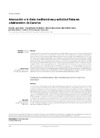Please use this identifier to cite or link to this item:
https://accedacris.ulpgc.es/jspui/handle/10553/72785
| DC Field | Value | Language |
|---|---|---|
| dc.contributor.author | López, Eduardo López | en_US |
| dc.contributor.author | Valdivielso, Manuel Navarro | en_US |
| dc.contributor.author | Ojeda García, Roberto | en_US |
| dc.contributor.author | Ojeda, Estrella Brito | en_US |
| dc.contributor.author | Caballero, José Antonio Ruiz | en_US |
| dc.contributor.author | Navarro Hernández, Carmen Miriam | en_US |
| dc.date.accessioned | 2020-05-27T10:10:18Z | - |
| dc.date.available | 2020-05-27T10:10:18Z | - |
| dc.date.issued | 2013 | en_US |
| dc.identifier.issn | 0212-8799 | en_US |
| dc.identifier.other | Scopus | - |
| dc.identifier.uri | https://accedacris.ulpgc.es/handle/10553/72785 | - |
| dc.description.abstract | El objetivo de este estudio es describir el nivel de adecuación a la dieta mediterránea y su asociación con los niveles de práctica de actividad física en la población adolescente de la Comunidad de Canarias. Se seleccionó una muestra representativa de los estudiantes de ESO (Educación Secundaria Obligatoria) de las escuelas públicas de la Comunidad de Canarias (413 chicos y 387 chicas). La adecuación a la dieta mediterránea se midió con el cuestionario KIDMED y los niveles de práctica de actividad física se obtuvieron mediante el empleo del cuestionario “PACE Adolescent Physical Activity Measure”, recodifi cando la variable práctica de actividad física en dos grupos, los que cumplían y no cumplían las recomendaciones de práctica de actividad física tanto de intensidad moderada como vigorosa. Un 22,3% de los sujetos estudiados presentaron una dieta de muy baja calidad, un 52,9% un patrón que puede mejorar y un 24,9% una dieta mediterránea óptima. Así como la existencia de una asociación positiva con los niveles de práctica de actividad física. En conclusión, los sujetos estudiados presentaron unos datos nutricionales peores que los de hace diez años para población adolescente nacional y de las comunidades del centro y norte del territorio español. Con un elevado porcentaje de adolescentes (18,8%) que no desayunan. Los adolescentes que realizaban mayores niveles de práctica de actividad física tanto de intensidad moderada como vigorosa, mostraron una mayor adherencia al patrón alimentario que se asocia a la recomendación de dieta mediterránea óptima. | en_US |
| dc.description.abstract | The aim of the study was to describe the adequacy to Mediterranean diet and his association with the levels of practice of physical activity of the adolescent population of Canary Island Community. A representative sample of Canary Island Community secondary public school students (ESO), (413 boys and 387 girls) participated in the study. The adequacy to Mediterranean diet was measured with the KIDMED questionnaire and the levels of practice of physical activity was measured with the “PACE Adolescent Physical Activity Measure”, re-codifying the practical variable of physical activity in two groups, which were fulfi lling and fulfi lling the recommendations of practice of physical activity so much of intensity moderated like vigorous. A 22.3% of the subjects presented a very low quality diet, a 52.9% a diet that should improve and a 24.9% presented an optimal Mediterranean diet. As well as the existence of a positive association with the levels of practice of physical activity. In conclusion, the studied subjects presented a few nutritional information make a speech that those of ten years ago for teen national population and of the communities of the center and north of the Spanish territory. With a high percentage of teenagers (18,8%) they have not breakfast. And that the teenagers who realized major levels of practice of physical activity so much of intensity moderated like vigorous, showed a major adherence to the food boss who associates to the recommendation of Mediterranean ideal Diet. | en_US |
| dc.language | spa | en_US |
| dc.relation.ispartof | Archivos de Medicina del Deporte | en_US |
| dc.source | Archivos de Medicina del Deporte[ISSN 0212-8799],v. 30 (156), p. 208-214, (Julio 2013) | en_US |
| dc.subject | 5802 Organización y planificación de la educación | en_US |
| dc.subject.other | Adolescents | en_US |
| dc.subject.other | Kidmed | en_US |
| dc.subject.other | Mediterranean Diet | en_US |
| dc.subject.other | Physical Activity | en_US |
| dc.title | Adecuación a la dieta mediterránea y actividad física en adolescentes de Canarias | en_US |
| dc.type | info:eu-repo/semantics/Article | en_US |
| dc.type | Article | en_US |
| dc.identifier.scopus | 84884396248 | - |
| dc.contributor.authorscopusid | 55859623800 | - |
| dc.contributor.authorscopusid | 45161918000 | - |
| dc.contributor.authorscopusid | 55859770300 | - |
| dc.contributor.authorscopusid | 45161581500 | - |
| dc.contributor.authorscopusid | 45161020500 | - |
| dc.contributor.authorscopusid | 55859842000 | - |
| dc.description.lastpage | 214 | en_US |
| dc.identifier.issue | 156 | - |
| dc.description.firstpage | 208 | en_US |
| dc.relation.volume | 30 | en_US |
| dc.investigacion | Ciencias Sociales y Jurídicas | en_US |
| dc.type2 | Artículo | en_US |
| dc.utils.revision | Sí | en_US |
| dc.date.coverdate | Julio 2013 | en_US |
| dc.identifier.ulpgc | Sí | es |
| dc.description.sjr | 0,11 | |
| dc.description.sjrq | Q4 | |
| dc.description.sellofecyt | Sello FECYT | |
| dc.description.dialnetimpact | 0,0 | |
| dc.description.dialnetq | Q3 | |
| item.grantfulltext | open | - |
| item.fulltext | Con texto completo | - |
| crisitem.author.fullName | Ojeda García, Roberto | - |
| crisitem.author.fullName | Navarro Hernández, Carmen Miriam | - |
| Appears in Collections: | Artículos | |
Show simple item record
SCOPUSTM
Citations
13
checked on Jun 8, 2025
Page view(s) 1
423
checked on Jan 11, 2026
Download(s)
149
checked on Jan 11, 2026
Google ScholarTM
Check
Share
Export metadata
Items in accedaCRIS are protected by copyright, with all rights reserved, unless otherwise indicated.
